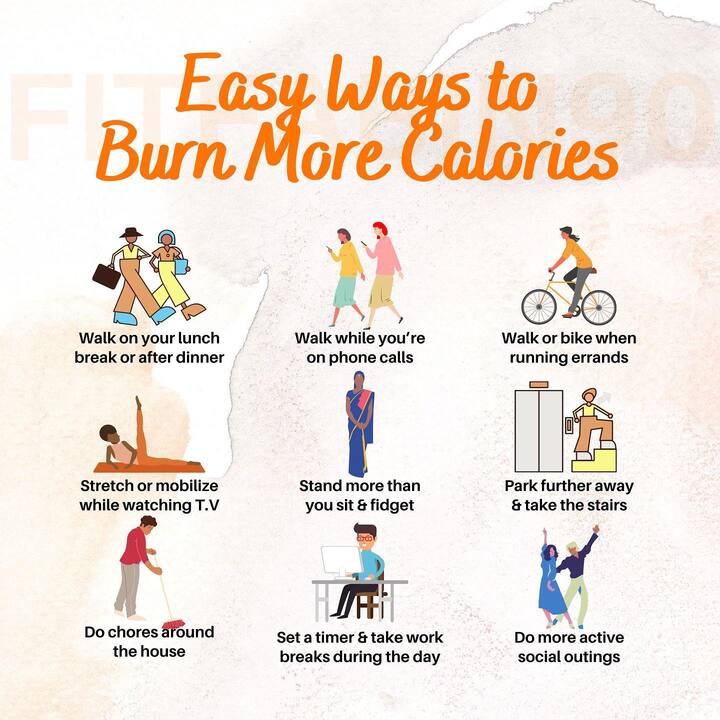When it comes to maintaining good health, we all know the basics: eat well, exercise regularly, and get enough sleep. However, even the healthiest among us might be unknowingly sabotaging their well-being with certain daily habits. These habits seem harmless, maybe even beneficial, but they could be secretly wreaking havoc on your health. Ready to uncover these sneaky culprits? Let’s dive into the top 10 surprising habits that could be ruining your health.
1. Skipping Breakfast: The Myth of Morning Fasting
The Habit: Skipping breakfast to save time or cut calories.
Why It’s Bad: Breakfast is often called the most important meal of the day, and for good reason. After a night of fasting, your body needs fuel to kickstart your metabolism and provide energy for the day ahead. Skipping breakfast can lead to a sluggish metabolism, increased cravings later in the day, and even weight gain.
The Science: Studies have shown that those who skip breakfast are more likely to consume more calories throughout the day, particularly from unhealthy snacks. Additionally, skipping breakfast can impair cognitive function, making it harder to concentrate and remember things.
What You Can Do: Even if you’re in a rush, opt for a quick and healthy breakfast like a smoothie, yogurt with fruits, or a piece of whole-grain toast with avocado. Your body will thank you!
2. Overloading on “Healthy” Snacks
The Habit: Reaching for granola bars, nuts, or dried fruits as a healthy snack.
Why It’s Bad: While these snacks are certainly better than a bag of chips, they can still pack a hefty calorie punch. Many “healthy” snacks are loaded with added sugars, sodium, and unhealthy fats that can contribute to weight gain and other health issues if consumed in excess.
The Science: Portion control is key. For example, nuts are a great source of healthy fats, but just a small handful (about 1 ounce) is all you need. Dried fruits, while nutritious, can contain high amounts of concentrated sugar and calories.
What You Can Do: Keep an eye on serving sizes and try to pair snacks with a source of protein or fiber to help keep you full. Fresh fruit, vegetables with hummus, or a small handful of nuts are great options.
3. Using Your Smartphone Before Bed
The Habit: Scrolling through social media or checking emails right before hitting the sack.
Why It’s Bad: The blue light emitted from your smartphone, tablet, or computer screen can interfere with your body’s natural sleep-wake cycle by suppressing the production of melatonin, the hormone that regulates sleep.
The Science: Research has shown that exposure to blue light before bed can delay sleep onset, reduce the quality of sleep, and make it harder to wake up feeling refreshed. Poor sleep has been linked to a host of health problems, including obesity, heart disease, and depression.
What You Can Do: Try to establish a tech-free bedtime routine at least an hour before you plan to sleep. This could include reading a book, taking a warm bath, or practicing relaxation techniques like deep breathing or meditation.
4. Sitting for Long Periods
The Habit: Spending hours on end sitting at a desk, in front of the TV, or during long commutes.
Why It’s Bad: Prolonged sitting has been dubbed the “new smoking” due to its negative impact on health. It can lead to poor posture, back pain, and an increased risk of chronic conditions like heart disease, diabetes, and even some cancers.
The Science: Research has shown that even if you exercise regularly, sitting for long periods can still negatively impact your health. Sitting for more than eight hours a day has been associated with a 90% increased risk of developing type 2 diabetes.
What You Can Do: Aim to take breaks every 30 minutes to stand up, stretch, and move around. Consider using a standing desk, taking a walk during lunch breaks, or incorporating more physical activity into your day.
5. Drinking Diet Soda
The Habit: Opting for diet soda instead of regular soda to cut down on sugar and calories.
Why It’s Bad: While diet sodas may be free of sugar and calories, they’re packed with artificial sweeteners that can confuse your body’s natural metabolic processes. This can lead to increased cravings for sweet foods and drinks, and in some cases, weight gain.
The Science: Studies suggest that artificial sweeteners may alter the gut microbiome and increase the risk of metabolic syndrome, which includes conditions like high blood pressure, high blood sugar, and abnormal cholesterol levels.
What You Can Do: Try swapping diet soda for healthier alternatives like sparkling water with a splash of fruit juice or herbal teas. Your taste buds and waistline will appreciate the change.
6. Ignoring Mental Health
The Habit: Focusing solely on physical health and neglecting mental well-being.
Why It’s Bad: Mental and physical health are deeply interconnected. Ignoring stress, anxiety, or depression can take a toll on your physical health, leading to issues like headaches, digestive problems, and a weakened immune system.
The Science: Chronic stress has been shown to increase the risk of conditions like heart disease, stroke, and diabetes. Moreover, mental health conditions can lead to unhealthy behaviors such as poor diet, lack of exercise, and substance abuse.
What You Can Do: Make mental health a priority by incorporating stress-relief techniques into your daily routine. This could include mindfulness meditation, regular exercise, talking to a therapist, or simply taking time to unwind and relax.
7. Multitasking While Eating
The Habit: Eating meals while watching TV, working, or scrolling through your phone.
Why It’s Bad: Multitasking while eating can lead to mindless eating, where you consume more food than you realize. This can contribute to overeating, weight gain, and poor digestion.
The Science: Studies have shown that people who eat while distracted tend to consume more calories and feel less satisfied after eating. This can lead to overeating later in the day and an increased risk of obesity.
What You Can Do: Practice mindful eating by focusing on your meal without distractions. Take the time to savor each bite, chew thoroughly, and pay attention to your body’s hunger and fullness cues.
8. Over-Sanitizing Your Environment
The Habit: Using antibacterial soaps, hand sanitizers, and disinfectants excessively.
Why It’s Bad: While cleanliness is important, over-sanitizing can weaken your immune system by reducing your exposure to beneficial bacteria that help build immunity. This can make you more susceptible to infections and allergies.
The Science: The “hygiene hypothesis” suggests that a lack of exposure to microbes in early life can lead to a weakened immune system and an increased risk of allergies, asthma, and autoimmune diseases.
What You Can Do: Instead of constantly reaching for antibacterial products, opt for regular soap and water when washing your hands. Allow your body to build immunity naturally by not obsessing over every germ.
9. Overtraining
The Habit: Pushing your body to the limit with intense workouts every day.
Why It’s Bad: While regular exercise is essential for good health, overtraining can lead to burnout, injuries, and a weakened immune system. It can also increase the risk of overuse injuries, such as stress fractures, tendonitis, and muscle strains.
The Science: Overtraining syndrome can cause symptoms like chronic fatigue, insomnia, decreased performance, and mood disturbances. It can also elevate cortisol levels, leading to increased stress and impaired recovery.
What You Can Do: Balance your workout routine with adequate rest and recovery. Incorporate rest days, vary your workouts, and listen to your body’s signals to prevent overtraining.
10. Holding Grudges
The Habit: Holding onto anger, resentment, or grudges for extended periods.
Why It’s Bad: Negative emotions like anger and resentment can have a profound impact on your physical health. Chronic anger has been linked to heart disease, high blood pressure, and even a weakened immune system.
The Science: Research shows that forgiveness can lead to lower levels of stress, anxiety, and depression, as well as improved heart health and immune function.
What You Can Do: Practice forgiveness and let go of grudges. This doesn’t mean condoning harmful behavior, but rather freeing yourself from the negative emotions that can harm your health.
11. Not Drinking Enough Water
The Habit: Forgetting to stay hydrated throughout the day.
Why It’s Bad: Water is essential for nearly every bodily function, from regulating temperature to flushing out toxins. Dehydration can lead to headaches, fatigue, dry skin, and even kidney problems over time.
The Science: Studies show that even mild dehydration can impair mood, memory, and brain performance. Chronic dehydration has been linked to an increased risk of kidney stones and urinary tract infections.
What You Can Do: Make it a habit to drink water regularly throughout the day. Carry a water bottle with you, set reminders on your phone, or use a hydration tracking app to ensure you’re meeting your daily water intake.
12. Eating Late at Night
The Habit: Snacking or having meals right before bed.
Why It’s Bad: Eating late at night can disrupt your sleep patterns and contribute to weight gain. Your body’s metabolism slows down at night, making it harder to burn off the calories consumed.
The Science: Research has shown that late-night eating is associated with higher levels of body fat and an increased risk of obesity. It can also lead to indigestion, acid reflux, and poor sleep quality.
What You Can Do: Try to have your last meal at least 2-3 hours before bed. If you’re hungry at night, opt for a light, healthy snack like a small piece of fruit or a handful of nuts.
13. Wearing Tight Clothing
The Habit: Frequently wearing tight, restrictive clothing for fashion or support.
Why It’s Bad: Tight clothing can restrict blood flow, cause nerve compression, and lead to discomfort or pain. It can also contribute to digestive issues like acid reflux or heartburn.
The Science: Wearing tight clothes, especially around the abdomen, can increase pressure on the stomach, leading to acid reflux. Tight clothing around the legs can also impede circulation, potentially leading to varicose veins or blood clots.
What You Can Do: Opt for comfortable, well-fitting clothing that doesn’t restrict movement or compress your body. If you need to wear tight clothing for a short period, make sure to change into something more comfortable as soon as possible.
14. Brushing Your Teeth Right After Eating
The Habit: Brushing your teeth immediately after finishing a meal.
Why It’s Bad: While it’s important to maintain oral hygiene, brushing your teeth right after eating, especially acidic foods, can do more harm than good. The acids from food can weaken the enamel on your teeth, and brushing too soon can wear it away.
The Science: Dental experts recommend waiting at least 30 minutes after eating before brushing your teeth to allow your saliva to neutralize the acids and protect your enamel.
What You Can Do: After eating, rinse your mouth with water and wait 30 minutes before brushing. This will help protect your enamel while keeping your teeth clean.
15. Holding in Your Emotions
The Habit: Bottling up feelings of anger, sadness, or frustration instead of expressing them.
Why It’s Bad: Repressing emotions can lead to increased stress, anxiety, and even physical health issues like headaches, high blood pressure, and digestive problems. Over time, this can contribute to mental health disorders such as depression or anxiety.
The Science: Studies have shown that suppressing emotions can lead to increased stress levels, weakened immune function, and a higher risk of chronic health conditions. Emotional expression is essential for mental and physical well-being.
What You Can Do: Find healthy outlets for your emotions, such as talking to a friend or therapist, journaling, or engaging in creative activities like painting or music. Learning to express and process your emotions can lead to better mental and physical health.
16. Overusing Hand Sanitizer
The Habit: Frequently using hand sanitizer instead of washing your hands with soap and water.
Why It’s Bad: While hand sanitizer is useful, especially when soap and water aren’t available, overuse can strip your skin of its natural oils and beneficial bacteria. This can lead to dry, cracked skin, making it more susceptible to infections. Moreover, excessive use of hand sanitizers containing alcohol can cause skin irritation.
The Science: Hand sanitizers, particularly those with high alcohol content, can disrupt the skin’s microbiome, the community of beneficial bacteria that protects against harmful pathogens. Overuse can also contribute to antibiotic resistance, as some hand sanitizers contain triclosan, a chemical that has been linked to the development of resistant bacteria.
What You Can Do: Use hand sanitizer only when necessary, such as when soap and water aren’t available. When you can, wash your hands with soap and warm water for at least 20 seconds, which is more effective at removing germs and dirt. Also, moisturize your hands regularly to keep your skin healthy and intact.
17. Overloading on Supplements
The Habit: Taking an excessive number of vitamins, minerals, or herbal supplements without proper guidance.
Why It’s Bad: While supplements can be beneficial, taking too many can lead to toxicity or negative interactions with other medications. Overloading on certain nutrients can also cause imbalances in your body, leading to health issues.
The Science: Excessive intake of certain supplements, like vitamin A, vitamin D, or iron, can be harmful. For example, too much vitamin A can lead to liver damage, while excess iron can cause digestive problems and organ damage.
What You Can Do: Before taking any supplements, consult with a healthcare provider to ensure you’re taking the right ones in the correct dosages. Focus on getting most of your nutrients from a balanced diet rich in whole foods.
18. Sitting for Long Periods Without Moving
The Habit: Spending hours sitting at your desk, in front of the TV, or while commuting without taking breaks to move around.
Why It’s Bad: Prolonged sitting has been linked to a host of health issues, including obesity, heart disease, diabetes, and even early mortality. Sitting for long periods can also lead to poor posture, back pain, and decreased muscle tone.
The Science: Research has shown that sitting for more than 8 hours a day with little physical activity can increase the risk of dying early by up to 20%. Even if you exercise regularly, long periods of inactivity can negate some of the benefits.
What You Can Do: Incorporate more movement into your day by taking short breaks to stand up, stretch, or walk around every 30 minutes. Consider using a standing desk, taking the stairs instead of the elevator, or going for a walk during your lunch break.
19. Using Harsh Skincare Products
The Habit: Regularly using skincare products that contain strong chemicals, fragrances, or exfoliants.
Why It’s Bad: Harsh skincare products can strip your skin of its natural oils, leading to dryness, irritation, and even premature aging. Over-exfoliation can damage the skin’s protective barrier, making it more susceptible to environmental damage and infections.
The Science: Dermatologists warn that using products with high concentrations of alcohol, sulfates, or synthetic fragrances can lead to skin problems like acne, eczema, and dermatitis. Over time, these products can also contribute to the breakdown of collagen and elastin, leading to wrinkles and sagging skin.
What You Can Do: Opt for gentle, natural skincare products that are free of harsh chemicals and fragrances. Focus on nourishing and protecting your skin with hydrating cleansers, moisturizers, and sunscreen. If you’re unsure about which products to use, consult a dermatologist for personalized advice.
20. Drinking Too Much Fruit Juice
The Habit: Consuming large amounts of fruit juice daily, thinking it’s a healthier alternative to soft drinks.
Why It’s Bad: While fruit juice contains vitamins and nutrients, it’s also high in sugar, often comparable to sugary sodas. Excessive consumption can lead to weight gain, blood sugar spikes, and an increased risk of developing type 2 diabetes.
The Science: Even 100% fruit juice lacks the fiber found in whole fruits, which helps regulate blood sugar levels. The rapid absorption of sugar from juice can cause insulin spikes and contribute to metabolic issues over time. Additionally, fruit juice is calorie-dense, which can lead to unintentional overconsumption of calories.
What You Can Do: Limit your intake of fruit juice and opt for whole fruits instead, which provide fiber and help you feel fuller for longer. If you enjoy juice, try diluting it with water to reduce the sugar content, or treat it as an occasional treat rather than a daily beverage.
Final Thoughts: Small Changes, Big Impact
It’s easy to overlook the impact of daily habits, especially those that seem benign or even beneficial. However, as we’ve seen, some of these habits can secretly undermine your health over time. The good news is that by making small, mindful changes, you can protect your health and well-being in the long run.
Remember, it’s not about perfection but about balance. Awareness is the first step toward positive change. So, take a closer look at your daily routine, identify any habits that might be working against you, and make the necessary adjustments. Your body and mind will thank you for it!




